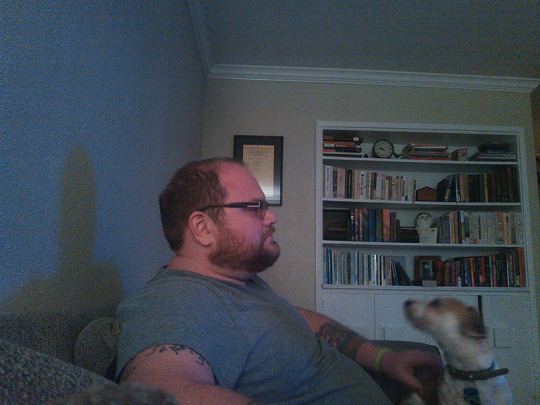
An Interview with Phil Estes
Phil Estes is the author of High Life, released this year from Horse Less Press, and the chapbooks Slowjams (Living Arts Press), Children of Reagan, and Gem City/Fountain City (both from Rabbit Catastrophe). His work has appeared, or is forthcoming, in Diagram, Prelude, Sprung Formal, West Wind Review, and elsewheres. He holds a PhD in Creative Writing from Oklahoma State. Currently, he lives in Shreveport, Louisiana and teaches at Louisiana Tech.
I recently read High Life and found it brilliantly dark and humorous, full of strange imagery and language. I talked to Phil via email for this interview.
—Brandon Hobson
BRANDON HOBSON: One of the poems in High Life is titled “Old World.” In it, two painters look at “the print of a half-closed eye/in the Swede’s hand.” In some of the other poems, too, there are glimpses of visual art. Are you interested in saying something specific about art in this book?
PHIL ESTES: I don’t know if I am trying to say anything specific about art as much as I am interested in the joke of prestige and articulation. I like how visual artists don’t talk about something when they talk about something. They kind of just nod their head, or deflect. When they do talk, it feels incredibly important. You see how their mind works, and it helps you listen, read, watch. I think sometimes when people talk about art they spend way too much time trying to articulate what the thing is, or else they get wrapped up in stuff that has nothing to do with the thing itself. Like when you go to a reading and the person gives a really long explanation to the piece, and then you hear the thing, and you go, “Why did they set it up?”
The molecules of origin are already in the fucking thing. What you made is doing more than your explanation, it is shooting for the uncanny. Let it do it.
BH: I think it’s hard to pull off.
PE: Yeah, I think doing the Jay Leno thing—”Have you heard this? have you seen this?“—the white-hetero-male-poet-lit-guy-in-the-v-neck sweater thing, “Did you see what I did there?” connects to prestige. Like you are trying to elevate your work, or emphasize a high/low culture thing that should be dead. I don’t think there’s a difference in materials, because something high or ethereal—Homer, Shakespeare, Michelangelo—is already in everything. We read and see that stuff when we’re not reading and seeing. That’s why I like visual artists and how they talk. The ones I look to in the poems (Basquiat, David...
You have reached your article limit
Sign up for a digital subscription and continue reading all new issues, plus our entire archives, for just $1.50/month.
Already a subscriber? Sign in




